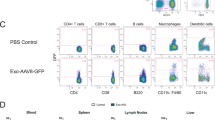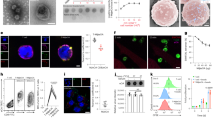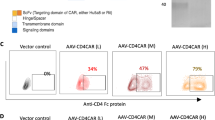Abstract
Recombinant adenovirus vectors are efficient at transferring genes into somatic tissues but are limited for use in clinical gene therapy by immunologic factors that result in the rapid loss of gene expression and inhibit secondary gene transfer. This study demonstrates that systemic coadministration of recombinant adenovirus with soluble CTLA4lg, which is known to block co–stimulatory signals between T cells and antigen presenting cells, leads to persistent adenoviral gene expression in mice without long–term immunosuppression. This form of immunotherapy greatly enhances the likelihood that recombinant adenovirus vectors will be useful for human gene therapy.
This is a preview of subscription content, access via your institution
Access options
Subscribe to this journal
Receive 12 print issues and online access
$209.00 per year
only $17.42 per issue
Buy this article
- Purchase on Springer Link
- Instant access to full article PDF
Prices may be subject to local taxes which are calculated during checkout
Similar content being viewed by others
References
Kay, M.A. & Woo, S.L.C. Gene therapy for metabolic disorders. Trends Genet. 10, 253–257 (1994).
Li, Q., Kay, M.A., Finegold, M., Stratford-Perricaudet, L.D. & Woo, S.L.C. Assessment of recombinant adenoviral vectors for hepatic gene therapy. Hum. Gene Ther. 4, 403–408 (1993).
Kay, M.A. et al. In vivo hepatic gene therapy: complete albeit transient correction of factor IX deficiency in hemophilia B dogs. Proc. natn. Acad. Sci. U.S.A. 91, 2353–2357 (1994).
Ishibashi, S. et al. Hypercholesterolemia in low density lipoprotein receptor knockout mice and its reversal by adenovirus-mediated gene delivery. J Clin. Invest. 92, 883–893 (1993).
Kozarsky, K.F. et al. In vivo correction of low density lipoprotein receptor deficiency in the Watanabe heritable hyperlipidemic rabbit with recombinant adenoviruses. J. biol. Chem. 269, 13695–13702 (1994).
Yang, Y. et al. Cellular immunity to viral antigens limits E1-deleted adenoviruses for gene therapy. Proc. natn. Acad. Sci. U.S.A. 91, 4407–4411 (1994).
Yang, Y., Ertl, H.C.J. & Wilson, J.M. MHC class l-restricted cytotoxic T lymphocytes to viral antigens destroy hepatocytes in mice infected with E1-deleted recombinant adenoviruses. Immunity 1, 433–442 (1994).
Smith, T.A. et al. Adenovirus mediated expression of therapeutic plasma levels of human factor IX in mice. Nature Genet. 5, 397–402 (1993).
Barr, D. et al. Strain related variations in adenovirally mediated transgene expression in mouse hepatocytes in vivo: comparisons between immunocompetent and immunodeficient inbred strains. Gene Ther. 2, 151–155 (1995).
Englehardt, J.F., Ye, X., Doranz, B. & Wilson, J.M. Ablation of E2A in recombinant adenoviruses improves transgene persistence and decreases inflammatory response in mouse liver. Proc. natn. Acad. Sci. U.S.A. 91, 6196–6200 (1994).
Hathcock, K.S. et al. Identification of an alternative CTLA4 ligand costimulatory for T cell activation. Science 262, 905–907 (1993).
Azuma, M. et al. B70 antigen is a second ligand for CTLA-4 and CD28. Nature 366, 76–79 (1993).
Linsley, P.S. & Ledbetter, J.A. The role of the CD28 receptor during T cell responses to antigen. A. Rev. Immunol. 11, 191–212 (1993).
Freeman, G. et al. Cloning of B7-2: a CTLA4 counter-receptor that costimulates human T cell proliferation. Science 262, 909–911 (1993).
Lin, H. et al. Long-term acceptance of major histocompatibility complex mismatched cardiac allografts induced by CTLA4lg plus donor-specific transfusion. J. exp. Med. 178, 1801–1806 (1993).
Lenschow, D.J. et al. Long-term survival of xenogeneic pancreatic islet grafts induced by CTLA4lg. Science 257, 789–792.
Finck, B.K., Linsley, P.S. & Wofsy, D. Treatment of murine lupus with CTLA4lg. Science 265, 1225–1227 (1994).
Kay, M.A., Graham, F., Leland, F. & Woo, S.L.C. Therapeutic serum concentrations of serum alpha 1-antitrypsin after adenoviral-mediated gene transfer to mouse hepatocytes in vivo. Hepatology 21, 815–819 (1995).
Kay, M.A. et al. Hepatic gene therapy: persistent expression of human alpha 1-antitrypsin in mice after direct gene delivery in vivo. Hum. Gene Ther. 3, 641–647 (1992).
Ponder, K.P. et al. Mouse heptocytes migrate to liver parenchyma and function indefinetely after intrasplenic transplantation. Proc. natn. Acad. Sci. U.S.A. 88, 1217–1221 (1991).
Dai, Y. et al. Cellular and humoral immune responses to adenoviral vectors containing factor IX gene: Tolerization of factor IX and vector antigens allows for long-term expression. Proc. natn. Acad. Sci. U.S.A. 92, 1401–1405 (1995).
Rinaldo, C.R. & Torpey, D.J. III. Cell-mediated immunity and immunosuppression in herpes simplex virus infection. Immunodeficiency 5, 33–90 (1993).
Simmons, A. & Tscharke, D.C. Anti-CD8 impairs clearance of herpes simplex virus from the nervous system: implications for the fate of virally infected neurons. J. exp. Med. 175, 1337–1244 (1992).
Shahinan, A. et al. Differential T cell costimulatory requirements in CD28-deficient mice. Science 261, 609–612 (1993).
Bluestone, J.A. New perspectives of CD28-B7-mediated T cell costimulation. Immunity 2, 555–559 (1995).
Nonoyama, S., Smith, F.O., Bernstein, I.D. & Ochs, H.D. Strain dependent leakiness of mice with severe combined immune deficiency. J. Immunol. 150, 3817–3824 (1993).
Nonoyama, S., Hollenbaugh, D., Aruffo, A., Ledbetter, J.A. & Ochs, H.D. B cell activation via CD40 is required for specific antibody production by antigen stimulated human B cells. J. exp. Med. 178, 1097–1102 (1993).
Paul, W.A. & Seder, W.E. Lymphocyte responses and cytokines. Cell 76, 241–251 (1994).
Nguyen, L., Knipe, D.M. & Finberg, R.W. Mechanism of virus-induced Ig subclass shifts. J. Immunol. 152, 478–484 (1994).
Scaria, A., Curiel, D. & Kay, M.A. Complementation of a human adenovirus early region 4 deletion mutant in 293 cells using adenovirus-polylysine-DNA complexes. Gene Ther. 2, 295–298 (1995).
Rawle, F.C. et al. Specificity of the mouse cytotoxic T lymphocytes response to adenovirus 5. J. Immunol 146, 3977–3984 (1991).
Knodell, R.G. et al. Formulation and application of a numerical scoring system for assessing histological activity in asymptomatic chronic active hepatitis. Hepatology 1, 431–435 (1981).
Lewis, D.B. et al. Interleukin 4 expressed in situ selectively alters thymocyte development J. exp. Med. 173, 89–100 (1994).
Author information
Authors and Affiliations
Rights and permissions
About this article
Cite this article
Kay, M., Holterman, AX., Meuse, L. et al. Long–term hepatic adenovirus–mediated gene expression in mice following CTLA4Ig administration. Nat Genet 11, 191–197 (1995). https://doi.org/10.1038/ng1095-191
Received:
Accepted:
Issue Date:
DOI: https://doi.org/10.1038/ng1095-191
This article is cited by
-
Gene therapy: light is finally in the tunnel
Protein & Cell (2011)
-
How not to be seen: immune-evasion strategies in gene therapy
Gene Therapy (2008)
-
Therapeutic short hairpin RNA expression in the liver: viral targets and vectors
Gene Therapy (2006)
-
Gutless adenovirus: last-generation adenovirus for gene therapy
Gene Therapy (2005)
-
CTLA4Ig delivered by high-capacity adenoviral vector induces stable expression of dystrophin in mdx mouse muscle
Gene Therapy (2004)



